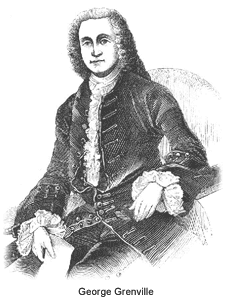Customs Service Reform
Following the conclusion of the Seven Years’ War, British officials had the opportunity to assess the functioning of North America as part of the emerging empire. Their findings were startling and begged for massive reform. American merchants had traded openly with the enemy during the conflict and smuggling appeared to be the rule rather than the exception. The welfare of the empire was playing second fiddle to local interests, particularly in the New England colonies. Further, the customs service — the royal agency charged with responsibility for collecting duties — was woefully inept. The cost of running the customs bureaucracy far exceeded its collections.
 George Grenville, a leading financial expert of the time, became prime minister in the fall of 1763. In an effort to bring some order to the chaotic functioning of the customs service, he instituted the following reforms:
George Grenville, a leading financial expert of the time, became prime minister in the fall of 1763. In an effort to bring some order to the chaotic functioning of the customs service, he instituted the following reforms:
- Customs commissioners were required to live in North America. Previously these officials continued to enjoy the delights of London or the English countryside while dispatching a functionary to the colonies to perform the duties of the office. These low-paid substitutes were notoriously inattentive and corrupt.
- The Royal Navy was empowered to act as customs agents in American waters. It was hoped that expanding the reach of collections agents would curtail the rampant smuggling operations.
- Authorization was given for the use of Writs of Assistance to aid in locating contraband.
- The jurisdiction of the admiralty courts was expanded to encompass a broader variety of maritime cases; these proceedings were unhindered by juries.
- Colonial governors, some of whom had been complicit in schemes to evade imperial trade regulations, were put on notice that they must strictly enforce all such laws.
Most American colonists understood that Parliament had the right and the duty to enforce laws regulating trade. However, many merchants felt that some of the legislation was unfair, subordinating their needs for profit to the maneuverings of more influential businessmen in England. The reform of the customs service, coupled with other
Grenville programs, began to raise concerns among American about the lessening of their rights as Englishmen.
See timeline of the
American Revolution.
 George Grenville, a leading financial expert of the time, became prime minister in the fall of 1763. In an effort to bring some order to the chaotic functioning of the customs service, he instituted the following reforms:
George Grenville, a leading financial expert of the time, became prime minister in the fall of 1763. In an effort to bring some order to the chaotic functioning of the customs service, he instituted the following reforms: